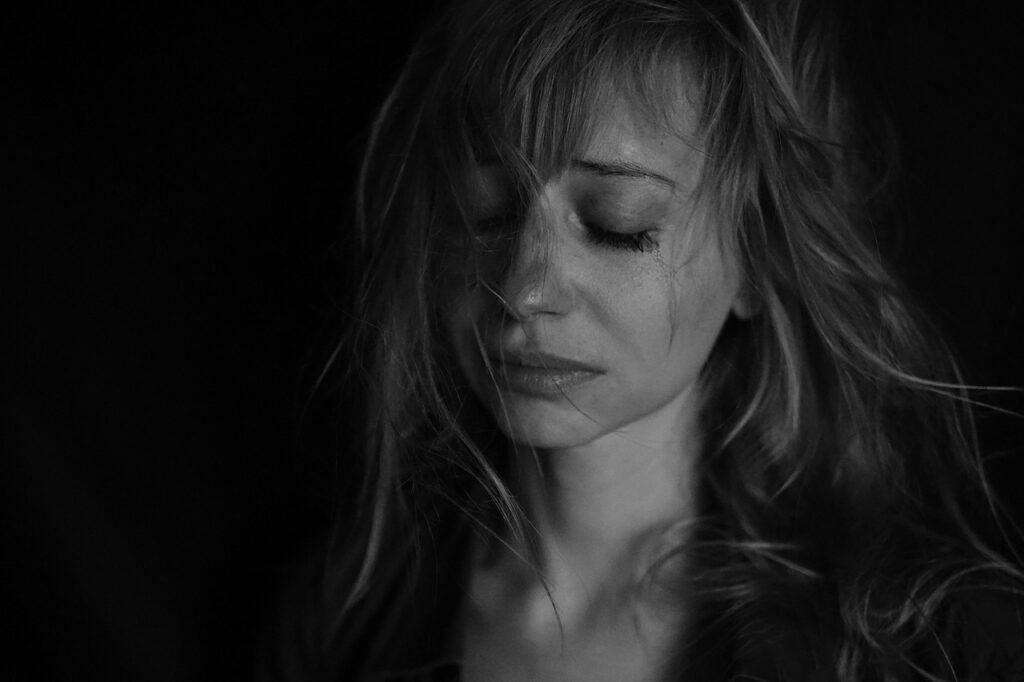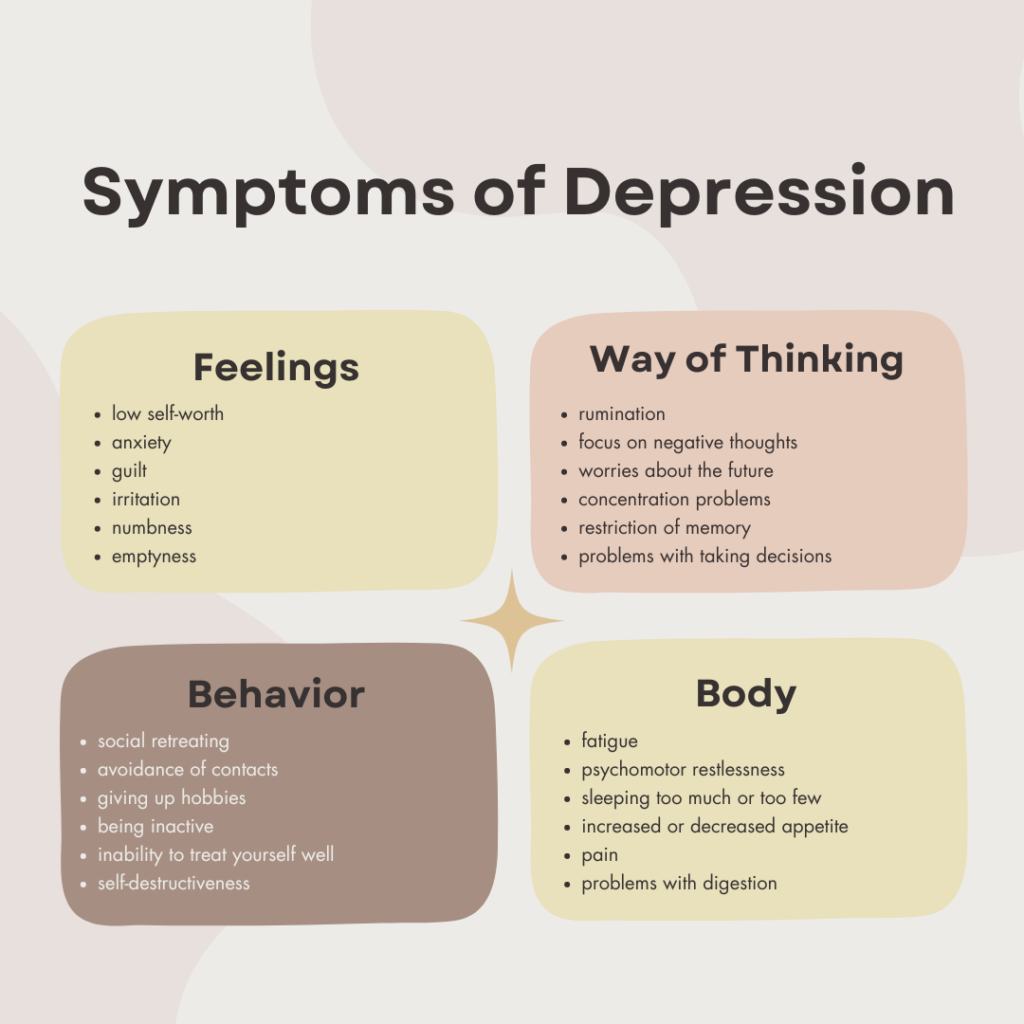The symptoms of depression: depression affects 4.4% of people worldwide and influences feelings, thinking, body and behavior.

Depression is one of the most common mental health conditions, affecting around 4.4% of people worldwide — an 18% increase over the past 10 years. On top of that, there is a significant number of unreported cases, as many people hesitate to seek help due to feelings of shame, guilt, or a lack of awareness about treatment options.
Depression manifests in various forms, but it almost always affects emotions, thought patterns, the body, and behavior. The condition arises from a combination of genetic, environmental, psychological, and social factors, as illustrated by the biopsychosocial model.
Sadness vs. Depression
Everyone feels sad or lonely from time to time; these emotions are normal and an important part of life and personal growth. Depression, however, is something entirely different — and it requires professional support.
Have you recently felt as though a gray cloud has settled over your life? Things that once brought you joy now feel empty. Your motivation has disappeared, and you’re wondering whether this is “just a phase” — or perhaps something more. If you see yourself in these words, you’re not alone. Depression affects many people, and it’s brave and important to take a closer look so you can recognize the symptoms in an early stage.
In this post, I’ll help you to better understand the different aspects of depression — from the clinical definition to typical thought patterns, and practical ways to “declutter” your depression and stop the depressive overthinking.
What Exactly Is Depression?
The Symptoms of Depression: Depression is much more than just sadness. It’s a serious mental illness that can affect thoughts, feelings, the body, and behavior. The world feels colorless, your heart feels heavy, and hope seems distant. But the more you understand, the better you can help yourself — or someone you love.
Mild, Moderate, Severe: The ICD-10 Classification
The World Health Organization (WHO) categorizes depression by severity:
Mild Depression (F32.0):
You experience at least two core symptoms: low mood, loss of interest, lack of energy.
Additionally, you have two other symptoms such as sleep problems, reduced appetite, slowed movements, restlessness, trouble concentrating, indecisiveness, or thoughts of not wanting to live any more.
Moderate Depression (F32.1):
Two core symptoms and three to four additional symptoms.
Your daily life is clearly affected, but not unmanageable.
Severe Depression (F32.2):
Three core symptoms and four or more additional symptoms.
Often includes feelings of worthlessness, suicidal thoughts, or severe psychomotoric retardation.
Endogenous vs. Exogenous Depression – What’s the Difference?
There is sometimes a distinction between:
Endogenous Depression: Seems to arise “out of nowhere.” Causes are biological, such as changes in brain chemistry or genetic predisposition.
Exogenous Depression: Triggered by external events like grief, job loss, or chronic overwhelm. Often seen as a reaction to these events, which is why it’s also called reactive depression.
The Biopsychosocial Model
This model shows that depression can have many causes:
- Biological: Hormonal imbalances, genetic predisposition, chronic illness
- Psychological: Negative thought patterns, trauma, low self-esteem
- Social: Loneliness, conflict, stress, lack of support
A depression usually doesn’t stem from a single issue — but from a lack of stability in several of these areas. As you can see, your depression is not a “flaw.” It has causes — and therefore, pathways to healing.
Who Can Help? Psychologist, Psychotherapist, or Psychiatrist?
- Psychologists have studied psychology and can diagnose and treat mental disorders using psychological methods.
- Psychotherapists provide structured therapy, such as cognitive behavioral therapy.
- Psychiatrists are medical doctors who can prescribe medication.
Often, a combination of psychotherapy and medication is helpful in understanding and managing the symptoms of depression.
Medication for Depression: Antidepressants
Some commonly used antidepressants include:
- SSRIs (e.g., Fluoxetine, Sertraline): Increase serotonin levels to improve mood and motivation.
- SNRIs (e.g., Venlafaxine, Duloxetine): Increase both serotonin and norepinephrine, useful for depression and chronic pain.
- Tricyclic Antidepressants (e.g., Amitriptyline): Affect multiple neurotransmitters, highly effective but may have more side effects.
- MAO Inhibitors (e.g., Moclobemide): Prevent breakdown of neurotransmitters, less commonly used due to interactions.
- Pregabalin: Originally used for anxiety and pain, can also help with depressive symptoms by affecting neural activity.
These medications help to stabilize your brain chemistry and reduce symptoms of depression.
Common Depressive Thought Patterns
If you’re depressed, you might think:
- “I can’t do anything right.”
- “I’m unlovable.”
- “Nothing matters.”
Important to know: These are not facts — they are depressive beliefs that can be changed through therapy.
Self-Help for Depression
You can “tidy up” your depression — step by step:
- Keep a mood journal.
- Get regular fresh air and physical movement.
- Eat a balanced, healthy diet.
- Spend time with people you trust.
- Practice daily gratitude for small things.
- Try meditation or progressive muscle relaxation.
These actions may seem small, but done consistently, they can make a big difference.
When Emotions Are Blocked
A common symptom of depression is anhedonia — the inability to feel pleasure. Many people say, “I just don’t feel anything anymore.” This emotional numbness can make self-understanding even harder. It’s often a defense mechanism, developed when key emotions have been suppressed for too long.
“Homesickness Depression”: When Everything Feels Foreign
You might wonder why you feel so out of place in your own life. Some people describe a “homesickness depression” — a deep longing for safety, comfort, or a sense of belonging.
Free Depression Self-Test
You can find an online self-test at www.deutsche-depressionshilfe.de.
It can help give you orientation, but it does not replace professional diagnosis or treatment.
Apps for Depression
- MindDoc: Daily check-ins & personalized recommendations
- iFightDepression: Scientifically validated guidance
These can support you in everyday life, but are not a substitute for therapy.
Online Therapy: A flexible Opportunity
If you can’t find an in-person therapy or feel more comfortable speaking from your home, online therapy might be right for you. It’s location-independent, flexible, discreet, and often quicker to access than traditional in-person therapy.
Are you unsure whether you might be experiencing depression?
Do you suspect you’re going through an episode?
Do you want to learn how to cope with the symptoms and reclaim your joy?
Let’s talk about it in a free initial session.

References:
- Weltgesundheitsorganisation (WHO)
Internationale Klassifikation psychischer Störungen (ICD-10):
https://www.dimdi.de/static/de/klassifikationen/icd/icd-10-gm/ - Deutsche Depressionshilfe
Fachlich fundierte Informationen zu Symptomen, Verlauf, Behandlung und Selbsttests:
https://www.deutsche-depressionshilfe.de - Leitlinien der Deutschen Gesellschaft für Psychiatrie und Psychotherapie, Psychosomatik und Nervenheilkunde (DGPPN)
S3-Leitlinie zur Unipolaren Depression:
https://www.awmf.org/leitlinien/detail/ll/051-028.html - Psychiatrie Verlag (zu endogener vs. exogener Depression und biopsychosozialem Modell):
Kupfer, J., Linden, M., & Rüddel, H. (Hrsg.). (2020). Lehrbuch Psychiatrie und Psychotherapie. Beltz Juventa. - National Institute of Mental Health (NIMH)
Wissenschaftliche Erklärungen zu Ursachen, Symptomen und Therapieformen:
https://www.nimh.nih.gov/health/topics/depression - MindDoc – App-Info & psychologische Begleitung:
https://minddoc.de/ - iFightDepression Tool (European Alliance Against Depression)
https://ifightdepression.com/en/self-management-resources/ifightdepression-tool - Psychiatrie und Psychotherapie kompakt – Erklärung von Anhedonie und depressiven Gedanken:
Berger, M. et al. (2021). Psychiatrie, Psychosomatik und Psychotherapie. Urban & Fischer. - Deutsches Ärzteblatt – Wirkung von Antidepressiva wie Pregabalin
https://www.aerzteblatt.de/archiv/199642/Pregabalin-bei-Angststoerungen-und-schmerzbedingter-Depression